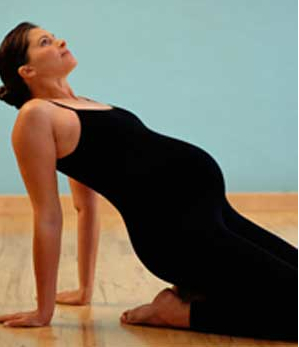Ask the Childbirth Educator: Weight Gain and Exercise During Pregnancy


I would like to know what a healthy weight gain is during pregnancy and if you should stop exercising or just slow down because so many people tell you that you shouldn’t exercise too much when you’re pregnant.
Shianne
Dear Shianne,
How much weight a woman should gain during pregnancy is a question many women ask and there is no single amount which is appropriate for every woman. The proper amount of weight to gain depends on a number of factors such as the woman’s pre-pregnancy weight, the quality of her diet before and during pregnancy, her ethnic background, and the number of previous pregnancies she has had.
To determine the right amount that you should gain, you should consult with your caregiver (doctor or midwife) and they’ll probably start with checking your BMI (or Body Mass Index) which takes into account your height and pre-pregnancy weight to gauge your total body fat. Once you’ve figured that out, you should be able to determine the appropriate amount of weight to gain during pregnancy.
Remember though that the recommendations are guidelines only. Some women gain more and some less during their pregnancy and their babies are fine. However, women who gain too little increase their risk of having a premature baby or one with low birth weight. Conversely, women who gain too much increase their risk of developing preterm labour (going into labour before 37 weeks), gestational diabetes, high blood pressure or macrosomia (having a large baby that can be difficult to deliver vaginally).
As a general rule of thumb though, most women will gain only a small amount in their first trimester (anywhere between 0.5kgs – 2.5kgs). From the second trimester, as your baby grows and amniotic fluid and blood volume starts to increase significantly, it is normal to gain up to 0.5kg a week (however, an overweight woman may only need to gain half that amount – about 0.25kgs a week).
To give you a sense of where the weight gain goes during pregnancy, here’s a breakdown of the weight distribution in a pregnancy with average weight gain:
Baby: 3-4 kgs
Placenta: 0.4 – 0.6kg
Uterus: 0.9kg
Amniotic fluid: 0.9kg
Breasts: 0.5kgs
Blood volume: 1.1kg
Fat: 2.2 – 3.6kgs
Tissue fluid: 2.7kgs
Total: 12.2kg – 14.3kgs
One thing women should be on the lookout for though is sudden and excessive weight gain or loss as this can be a sign of illness or a condition known as preeclampsia and should be checked by a doctor straight away.
Don’t get too caught up (and stressed out!) about weight gain during pregnancy though. As long as you eat well during pregnancy and keep an eye on your weight gain (but not obsessively!) you should be fine.
Regarding exercise in pregnancy, it is generally recommended that pregnant women without medical complications exercise moderately and regularly during pregnancy (30 minutes or more on most, if not all days of the week). If you haven’t been active before becoming pregnant, now is not the time to start training for a triathlon, so start slowly and build up over time.
Regular, moderate physical exercise during pregnancy improves or maintains muscle tone, strength and endurance. Exercise also protects against back pain, reduces the intensity of common pregnancy discomforts, and boosts your energy level, mood and self-image. During the last trimester, regular exercise increases your body’s production of endorphins (our natural pain relievers) which can really help you cope in labour.
The type of exercise you can do safely depends on your health and fitness level. Avoid activities with a high risk of falling or hurting the abdomen such as downhill or water skiing, racquet sports, horseback riding, scuba diving or contact sports.
Always start your workout with a warm up and stretch and focus on moderate, low impact activities such as walking, swimming or cycling. Many women also enjoy doing prenatal yoga, Pilates or specially developed prenatal fitness programs such as Preggi Bellies. In addition to keeping you healthy and fit during your pregnancy, it can be great opportunity to make new friends and socialise with other pregnant women.
Some important things to remember when exercising during pregnancy:
- Consult with your care provider before starting any kind of fitness regime – especially if you have been relatively inactive prior to getting pregnant.
- Build your strength and endurance gradually.
- Modify your exercise if necessarily so that it is safe and appropriate for pregnancy.
- Be sure to drink regularly before, during and after exercising – carry a water bottle with you.
- Don’t exercise vigorously in very hot or humid weather.
- Stop exercising immediately if you experience pain, headache, nausea, severe breathlessness, dizziness, blurred vision (or you see spots), vaginal bleeding or if you start to experience regular contractions.
Finally, one exercise ALL pregnant women can (and should) do throughout pregnancy – and after giving birth is your pelvic floor exercises, often known as Kegels. You don’t even need to get out of your chair to do these! Our pelvic floor takes a bit of a battering during pregnancy and labour, and it is very important to keep these muscles strong in order to prevent future incontinence.
Additional Resources:
http://www.betterhealth.vic.gov.au/bhcv2/bhcarticles.nsf/pages/Pregnancy_and_exercise
http://sma.org.au/wp-content/uploads/2009/05/pregnancystatement.pdf
Tanya Strusberg is a Lamaze Certified Childbirth Educator (LCCE) and teaches prenatal education to pregnant women and their partners in Melbourne.
She and her husband Doron have two beautiful children, Liev and Amalia.
To learn more visit www.birthwellbirthright.com
Facebook: https://www.facebook.com/birthwellbirthright
Disclaimer: The information contained in this column is of a general nature only and does not constitute formal medical advice. Any specific medical problem should be referred directly to a qualified health professional.










